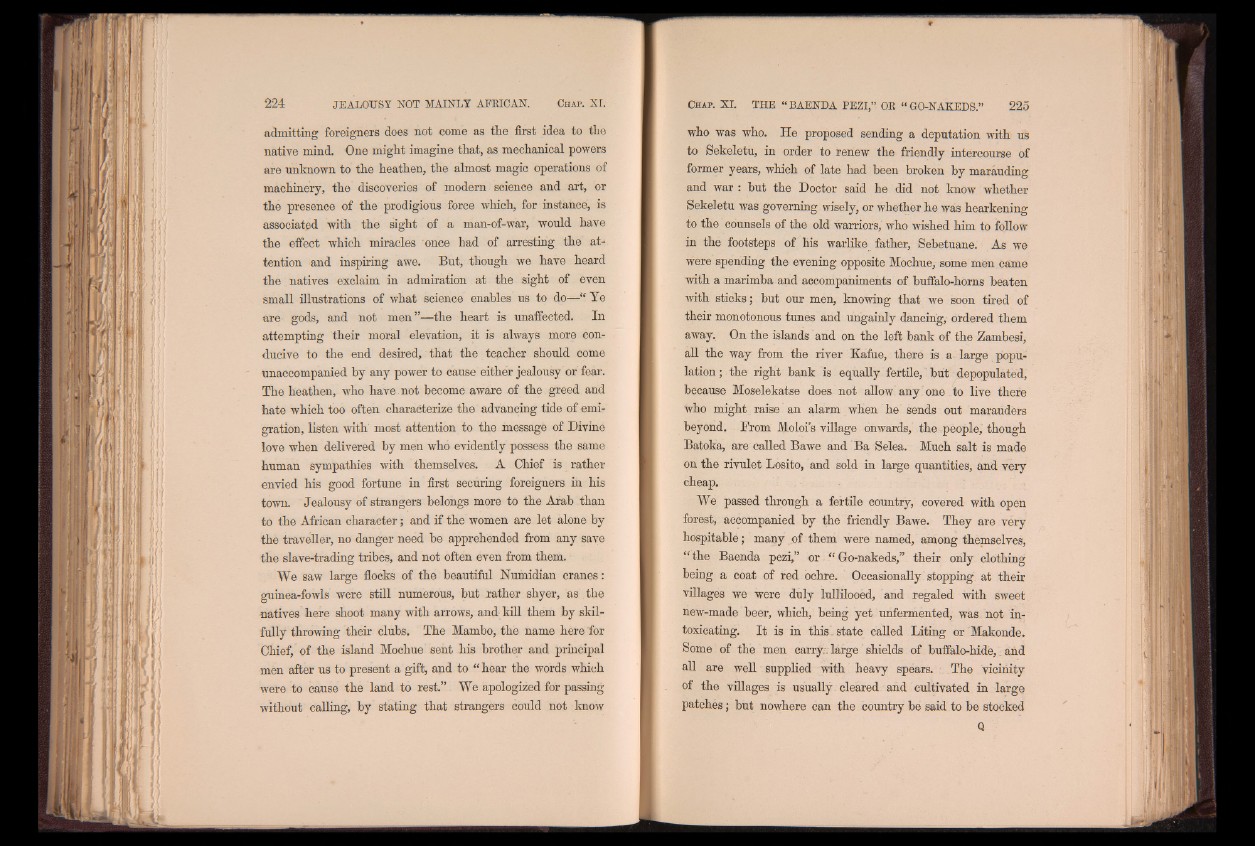
admitting foreigners does not come as the first idea to the
native mind. One might imagine that, as mechanical powers
are unknown to the heathen, the almost magic operations of
machinery, the discoveries of modern science and art, or
the presence of the prodigious force which, for instance, is
associated with the sight of a man-of-war, would have
the effect which miracles once had of arresting the attention
and inspiring awe. But, though we have heard
the natives exclaim in admiration at the sight of even
small illustrations of what science enables us to do—“ Ye
are gods, and not men”—the heart is unaffected. In
attempting their moral elevation, it is always more conducive
to the end desired, that the teacher should come
unaccompanied by any power to cause either jealousy or fear.
The heathen, who have not become aware of the greed and
hate which too often characterize the advancing tide of emigration,
listen with' most attention to the message of Divine
love when delivered by men who evidently possess the same
human sympathies with themselves. A Chief is rather
envied his good fortune in first securing foreigners in his
town. Jealousy of strangers belongs more to the Arab than
to the African character; and if the women are let alone by
the traveller, no danger need he apprehended from any save
the slave-trading tribes, and not often even from them.
We saw large flocks of the beautiful Numidian cranes:
guinea-fowls were still numerous, but rather shyer, as the
natives here shoot many with arrows, and kill them by skilfully
throwing their clubs. The Mambo, the name here "for
Chief, of the island Mochue sent his brother and principal
men after us to present a gift, and to “ hear the words which
were to cause the land to rest.” We apologized for passing
without calling, by stating that strangers could not know
who was who. He proposed sending a deputation with us
to Sekeletu, in order to renew the friendly intercourse of
former years, which of late had been broken by marauding
and war : hut the Doctor said he did not know whether
Sekeletu was governing wisely, or whether he was hearkening
to the counsels of the old warriors, who wished him to follow
in the footsteps of his warlike father, Sebetuane. As we
were spending the evening opposite Mochue, some men came
with a marimba and accompaniments of bufialo-homs beaten
with sticks; hut our men, knowing that we soon tired of
their monotonous tunes and ungainly dancing, ordered them
away. On the islands and on the left bank of the Zambesi,
all the way from the river Kafue, there is a large population
; the right bank is equally fertile, but depopulated,
because Moselekatse does not allow any one to live there
who might raise an alarm when he sends out marauders
beyond. From Moloi’s village onwards, the people, though
Batoka, are called Bawe and Ba Selea. Much salt is made
on the rivulet Losito, and sold in large quantities, and very
cheap.
We passed through a fertile country, covered with open
forest, accompanied by the friendly Bawe. They are very
hospitable; many of them were named, among themselves,
“ the Baenda pezi,” or “ Go-nakeds,” their only clothing
being a coat of red ochre. Occasionally stopping at their
villages we were duly lullilooed, and regaled with sweet
new-made beer, which, being yet unfermented, was not intoxicating.
I t is in this state called Biting or Makonde.
Some of the men carry;, large shields of buffalo-hide, _ and
all are well supplied with heavy spears. The vicinity
of the villages is usually. cleared and cultivated in large
patches; but nowhere can the country be said to be stocked
Q